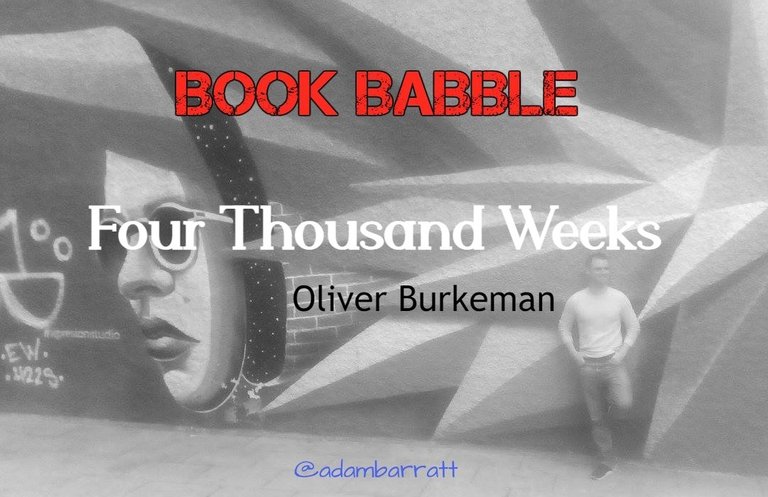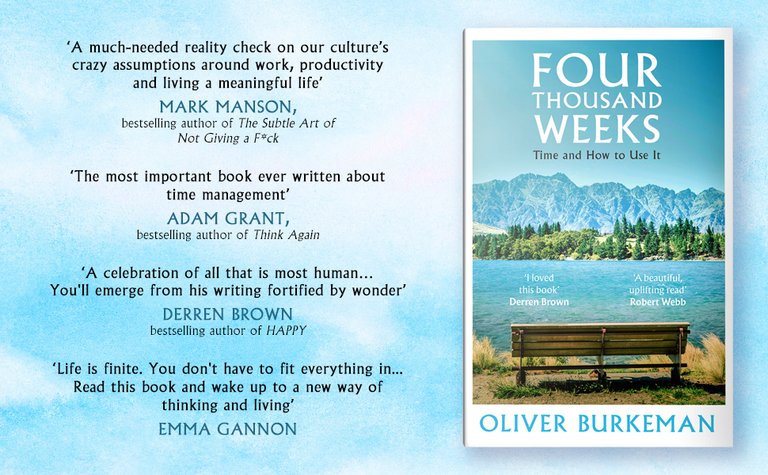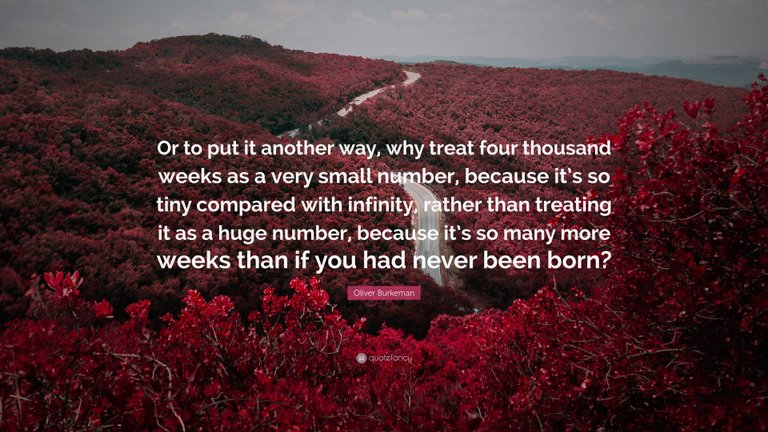Time management for mortals…

A little 'time management' with a twist today as we delve into the best ways to spend our precious hours, days and weeks.
The premise here is that if you live the current average lifespan of around 80 years, then that equates to about 4000 weeks, and those babies are ticking away.
This is a fairly recent book and builds upon the age-old theme of making the most of our time, and it offers an alternative look at 'productivity' and making the best of it all.
I hadn't heard of the author Oliver Burkeman prior, although I have been aware of this book flying around. Could be read in conjunction with some of Cal Newport's stuff as it has a similar air.
Let's dive into the juice!
Great quotes from the book followed by my thoughts
when people make enough money to meet their needs, they just find new things to need and new lifestyles to aspire to
Hedonic adaptation and all that. Everyone just adjusts to that new level and there's nothing wrong with that, but that is what is always going to happen. 'Needs', other than basic food/water/shelter is a subjective thing and we always adjust in one way or another.
The day will never arrive when you finally have everything under control
Just one more this or that, a little more here, a change over there, then we'll get there! Taking responsibility is fine, but there are too many variables outside of your control so it just ain't gonna happen. More control, sure, but not everything will be in its tidy little place.
The medieval farmer / task-orientated
Burkeman discusses the life of a medieval farmer, how they operated and how things have changed in modern times. It wasn't based on clock time, but rather tasks and when they could be and needed to be done.
Nowadays people try and assume control by overly attempting to manage their time, often to their detriment.

most of us invest a lot of energy, one way or another, in trying to avoid fully experiencing the reality in which we find ourselves
A lot of this productivity chasing and time management refining is a way of running from the truth and trying to create more life that doesn't exist. We are escaping from reality and meanwhile forgetting to live life.
John Lennon in fact said something along the lines of, life is that thing that passes you by when you're too busy making plans.
Or we plan compulsively, because the alternative is to confront how little control over the future we really have.
It gives us a sense of control - or we think it does - over something that is mostly outside of it. We have been given certain parameters that we need to work within, but we insist on trying to steal more, which doesn't always work out so well.
Not only do we not manage it, we may miss out on all the joys we could have had and what we may well have been seeking in the first place!
the more individual sovereignty you achieve over your time, the lonelier you get.
It's a paradox. We all want more freedom, but then the more you have often brings its own shackles and can isolate or distance you, which was never the goal. What you wanted was more control and enjoyment, but that can bring its own pitfalls when overpursued or not bring quite what you wanted.
the more you try to manage your time with the goal of achieving a feeling of total control, and freedom from the inevitable constraints of being human, the more stressful, empty and frustrating life gets.
This is the thing - this pursuit of something that isn't entirely possible, and maybe not even what you really want is causing stress in itself. You'll never quite reach that stage of control and you can spend your life chasing something that was never attainable and sent you on a merry-go-round, all whilst life was happening around you.
That's not to say that a lot of this stuff is worthless, it's definitely worthwhile being more efficient etc but it's more the fact that this can become an obsession in itself and a thirst that can never quite be quenched.
I’m aware of no other time management technique that’s half as effective as just facing the way things truly are.
Ultimately facing it square in the face, that it is what it is. A lot of this stuff is avoidance and finally admitting it and taking a step back and dealing with it as is, may be the best move.
And it means standing firm in the face of FOMO, the ‘fear of missing out’, because you come to realise that missing out on something – indeed, on almost everything – is basically guaranteed.
You're going to miss out on many things all the time. Just by doing one thing, you're not doing another. This is basic stuff and you can't be in 2 (or multiple) places ay once. So it's about recognising this, making the best choice for you at that time and disregarding the rest.
‘missing out’ is what makes our choices meaningful in the first place.
Exactly. The fact you could be doing all sorts means that picking one thing over another gives value and should be cherished. That's what also gives life meaning, the fact that there are about 4000 weeks (some a few more, some considerably less) which means we can't fritter it away and need to make use of it.
Without the 'time limit' there's no real reason to do much at all or enjoy precious moments which may well be gone tomorrow.

what in German has been called Eigenzeit, or the time inherent to a process itself.
Never heard of this, but then again I don't speak much German. It means 'proper time' or put another way the time inherent to a process itself, a concept that emphasises the importance of allowing processes to unfold naturally and not rushing them unduly.
the only route to psychological freedom is to let go of the limit-denying fantasy of getting it all done and instead to focus on doing a few things that count.
Proritising and going all in on those things. We can actually get a fair bit done over the course of time, but do need to focus on particular things each in its own time, otherwise we will be scattered and not get very far.
the very tool you’re using to get the most out of life makes you feel as though you’re missing out on even more of it.
The problem with Social Media and the like is its pro can also be its con. So it's great we can connect, share and all that great stuff, but we can now see more of what is possible that we could be doing. This creates stress and FOMO dissipating our time and energies further.
doing anything requires sacrifice – the sacrifice of all the other things you could have been doing with that stretch of time.
Goes back to 'missing out'. There is always an opportunity cost to everything. Doing anything will mean sacrificing anything else that could have been done, however important that may be deemed to be.
You have to choose a few things, sacrifice everything else, and deal with the inevitable sense of loss that results.
The original Latin word for ‘decide’, decidere, means ‘to cut off’, as in slicing away alternatives; it’s a close cousin of words like ‘homicide’ and ‘suicide’
'cide is to kill or cut away. That's what you're doing when you make a decision and it needs to be done or you'll get nowhere. Tough at times but necessary. You can always take new decisions as you go but there's no getting away from this (unless you want to spend a life treading water).
joy of missing out
JOMO! Flipping the switch, and instead of FOMO - fear - you now experience joy. Not quite sure how that works but the point is, be happy and grateful that you get to have these decisions to make, and that the one you went with was what you thought to be the best at the time, so enjoy it!
Maybe it will turn out this wasn't the case, but so what? All you can do is go on the information and how you feel at the time. Make the most of it and try not to worry too much about alternative paths.

The real measure of any time management technique is whether or not it helps you neglect the right things.
Does it push you in the right direction, or does it leave you chasing your tail?
Principle number one is to pay yourself first when it comes to time.
Give yourself time before giving to others. This is not to be selfish, but in fact give the most of yourself. Similar concept to paying yourself first when it comes to money, as discussed in The Richest Man in Babylon.
The second principle is to limit your work in progress.
We've always got loads on the go, and seem to think adding more is going to help matters. You can have many ideas and things to work on in the future, but you shouldn't have too much on your plate at any one time.
The third principle is to resist the allure of middling priorities.
These are those 'priorities' that aren't right at the top that would really make a difference at this time. They're also not lower down so far less important and easily dismissed. No, these cheeky buggers are in the middle and we try to keep them in the mix as they're 'nice to have' but they aren't a top priority and will distract us from the things that are.
So it’s not simply that our devices distract us from more important matters. It’s that they change how we’re defining ‘important matters’ in the first place.
There's a whole restructuring of the brain going on. Devices can take our attention away, but also make us believe that what's on said divices is more important than anything else.
each time you open a social media app, there are ‘a thousand people on the other side of the screen’ paid to keep you there
Yeah, these people are paid to get and keep your attention. No surprises there, but it may shock you how deep this actually goes. Psychologists and all are working against your willpower and other interests, and they are more than capable of winning the battle if we don't take back some of that control.
Hofstadter’s law
Planning fallacy. This is where projects always tend to take longer than anticipated and work fills the alloted time (and then some). We need to learn patience and not be overly optimistic.
Mexican fisherman
A great parable I see now and again. All this striving to get to where you could be without it. In this case the Mexican fisherman has the life he wants already and the businessman says he can grow his empire, and following that logic he ends up coming full circle...
‘Ah, well, then,’ the businessman replies, ‘you could spend your days drinking wine in the sun and playing music with your friends.’
the moment of truth is always now – that life is nothing but a succession of present moments, culminating in death, and that you’ll probably never get to a point where you feel you have things in perfect working order.
The point of focus is always now. It always was and always will be, a series of moments added together one after another. You'll never have it all together but you will miss all the parts that make life worth living if you constantly try too hard to find something that isn't there.
atelic activity
Atelic activity are those things that are done for their own sake, and not to achieve a particular end (which is Telic activity).
We often think that everything has to lead somewhere or it's pointless, but perhaps we should embrace just doing things because we can and hopefully getting some enjoyment in the process.
This will give is a better balance as well as not feel compelled to get some sort of 'return'.
patience becomes a form of power.
Patience is a superpower in itself. One of the best quotes I've seen on this is impatience with actions, patience with results.
As in get stuff done in a timely manner to move forward but you can't control the results of those actions so you have to wait it out.
Meanwhile, everyone else will be tearing their hair out whilst awaiting impatiently.
embrace radical incrementalism.
Bit by bit, getting better and better. Kaizen.
Atomic Habits, The Slight Edge and The 1% Rule are 3 books elaborating on this.
The Loneliness of the Digital Nomad
This was a chapter title and an interesting one for our times. It struck a cord as there does seem to be a paradox here with digital nomads and the like working remotely and being flexible with where they live and for how long... whilst simultaneously not building deeper connetions, ongoing community and perhaps feeling empty.
It differs for different people and at different times of course but this is a big subject and it's not always sunshine and rainbows, there is always a cost that may or may not be to your liking.
liberating truth: that what you do with your life doesn’t matter all that much – and when it comes to how you’re using your finite time, the universe absolutely could not care less.
The whole thing is on its way out anyway. It will be a lot more than 4000 weeks, but there's a cycle to everything, including the 'universe'.
keep a ‘done list’
Everyone has a to-do list and diligently tick things off as they go (or not), but this is a list of things that have been completed and gives a sense of accomplishment as well as being able to review what's been achieved.
Video review by Productivity Game
Top Takes
- Time is finite
We have 4000 weeks - focus on the essential and realise we can't do it all.
- Embrace limitations
There isn't a magic time management or productivity technique that will avoid this so we need to choose wisely.
- Reject the productivity trap
Don't keep on the hamster wheel of trying to be more productive, it will end up having the adverse effect.
- Be present in the moment
Speaks for itself. Not rushing through your 'to-dos' but exepriencing your life.
- Focus on relationships and meaning
If they resonate, then that's where your time and energy should be.
- Let go of perfectionism
It's a form of procrastination and will also never happen. Go for excellence and just get it out there.
- Embrace finitude
Life is relatively short and comes with trade-offs and opportunity costs. Accept it and live in alignment with your values.
Thanks Oliver! Anything Else?
An intelligently written book and does have the feel of something with a bit more weight than a lot of the regurgitated stuff out there.
As mentioned in the intro, it has a Cal Newport feel and the author has done a good dive to question our motives, real desires, and what actions we want to perform during our lifetimes.
It didn't feel like there were any resolutions or 'answers' per se but you'll never find that in a book anyway. They are there to give us a nudge to figure out these things for ourselves.
Not so much practical techniques, but something to make us think. Not just about how we spend our time but our endless pursuit of trying to hack and maximise it, as opposed to truly living it.
Well worth a read...
First image my own, other images and video linked to source
- 1-50: First 50 BookBabbles
- 51: THE DAILY STOIC - Ryan Holiday
- 52: MAKE TIME - Jake Knapp & John Zeratsky
- 53: GRIT - Angela Duckworth
- 54: WHAT I TALK ABOUT WHEN I TALK ABOUT RUNNING - Haruki Murakami
- 55: THE PURSUIT OF PERFECT - Tal Ben-Shahar
- 56: THE SLIGHT EDGE - Jeff Olson
- 57: CONTAGIOUS - Jonah Berger
- 58: THE RICHEST MAN IN BABYLON - George S. Clason
- 59: THE 5 AM CLUB - Robin Sharma
- 60: THINK LIKE DA VINCI - Michael Gelb
- 61: INFLUENCE - Robert Cialdini
- 62: THE ONE THING - Gary Keller
- 63: THE 12 WEEK YEAR - Brian Moran & Michael Lennington
- 64: THE POWER OF YOUR SUBCONSCIOUS MIND - Joseph Murphy
- 65: THE UNTETHERED SOUL - Michael A. Singer
- 66: ON WRITING WELL - William Zinsser
- 67: PRINCIPLES - Ray Dalio
- 68: HYPERFOCUS - Chris Bailey
- 69: THE OBSTACLE IS THE WAY - Ryan Holiday
- 70: EXTREME OWNERSHIP - Jocko Willink & Leif Babin
- 71: KNOWN - Mark Schaefer
- 72: THE LAST LECTURE - Randy Pausch
- 73: THE FIVE PEOPLE YOU MEET IN HEAVEN - Mitch Albom
- 74: FOUR THOUSAND WEEKS - Oliver Burkeman
- 75: THE ART OF TAKING ACTION - Gregg Krech
Posted Using InLeo Alpha
Congratulations @adambarratt! You have completed the following achievement on the Hive blockchain And have been rewarded with New badge(s)
Your next target is to reach 63000 upvotes.
You can view your badges on your board and compare yourself to others in the Ranking
If you no longer want to receive notifications, reply to this comment with the word
STOPCongratulations @adambarratt! You received a personal badge!
Thank you for participating in the Leo challenge.
You can view your badges on your board and compare yourself to others in the Ranking
Check out our last posts: